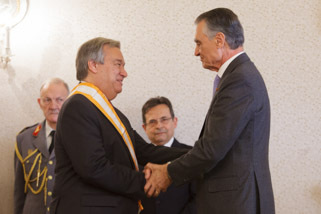
It is with great satisfaction that I take part, once again, in this award ceremony of the North-South Prize of the Council of Europe.
This year, the award pays tribute to two remarkable people, Monika Hauser and Asma Jahangir, evoking, through them, the values inscribed in the founding principals of the North-South Centre and the Council of Europe: freedom, tolerance, democracy, respect for human rights and human dignity.
We honour two individuals, two exemplary lives, who stand out for their strength, for their convictions, and for their work towards the propagation and promotion of those values.
The last few decades have been marked by increased affirmation of the value of protecting fundamental rights, based on the awareness of the value of human life, on the repudiation of the violations of the most basic human rights, on the search for economic and social policies that respect individual dignity and promote the well-being of communities.
It is, precisely, examples like these we are honouring here today that have had a determining role in this course. Beyond the action of governments and international organizations, the action which emerges from civil society itself is also fundamental. These two laureates have shown us the extent to which individual actions can make a difference.
It is therefore with immense pleasure that I join the tribute to Monika Hauser and Asma Jahangir and the recognition of the significant contributions that they have made to human dignity, tolerance and freedom.
Monika Hauser has had an extraordinary career dedicated to supporting women and women's rights. A gynaecologist, she has been in places of conflict and crisis in diverse parts of the globe, providing assistance to victims of war and various types of violence and abuse, including sexual. In Bosnia and Herzegovina, Kosovo, the Democratic Republic of Congo, Liberia and Afghanistan, she shared experiences and developed physical and psychological support projects. As director of the association "Medica Mondiale," she spearheaded the strengthening of women’s capacity for self-help and their right to personal development.
For over 20 years, "Medica Mondiale" has dedicated itself to supporting women and children who have been physically, psychologically, socially or politically violated. The effort and the credibility of the institution worn it the recognition and support of diverse entities.
Asma Jahangir's life is also a remarkable example of commitment to the promotion of human rights. An advocate of the Supreme Court of Pakistan, she has devoted 40 years of her life to defending, in particular, the rights of women, children and religious minorities. Her work, not only in Pakistan but also internationally, stands out in the continuing fight against discrimination.
The appointment of Asma Jahangir to the positions of UN Special Rapporteur on extrajudicial, summary or arbitrary executions and Special Rapporteur on freedom of religion or belief well illustrates her value and capacity. During her long career, she has had her work recognized many times.
Ladies and Gentlemen,
Both laureates are women totally committed to their projects and to their causes. They deal, directly and on a daily basis, with extremely difficult and complex realities. From suffering and adversity they know how to draw strength and conviction in defence of a society that is more just and more attentive to the most vulnerable. They have chosen, by courage and dedication, to take on special responsibilities. Their action, and this bears repeating, is an example to all of us. They deserve our full recognition.
Ladies and Gentlemen,
Allow me, now, a brief look at the North-South Centre. Next year will mark the 25th anniversary of the Centre. In this quarter century, the North-South concept has evolved. But the standards that justify the existence of the Centre - interdependence and solidarity - remain valid, even reinforcing its role in the deepening of intercultural dialogue, rapprochement and knowledge.
The Centre has distinguished itself among its partners outside of Europe, and it is very intriguing to see the countries of the Southern Mediterranean and other parts of Africa becoming increasingly interested in its activities. The problems that the Centre is going through originate primarily in the North, perhaps because it is the North that continues the debate on how best to address the new realities emerging in the South.
Portugal welcomes the fact that, within the Council of Europe, everything is moving towards giving the Centre a new dynamic and a new impetus. We support the efforts that the Centre has been making in order to refocus its actions and create a new program of activities.
Working with civil society, in particular with young people and women, is an increasingly important task, because it is from this work, as history has proven, that great changes are made.
I want to reiterate, in this context, the importance that Portugal gives to the Centre and the significance we attach to the awarding of the North-South Prize in an annual ceremony held at the highest level, in Lisbon.
The fact that we are gathered here today is indicative of the values and mission that guide the Council of Europe and the North-South Centre, and which this year’s two laureates illustrate in such a special and eloquent way.
Thank you very much.
© 2006-2016 Presidency of the Portuguese Republic
You have gained access to the records of the Official Site of the Presidency of the Republic from 9 March 2006 to 9 March 2016.
The contents available here were entered in the site during the 10 year period covering the two mandates of President of the Republic Aníbal Cavaco Silva.